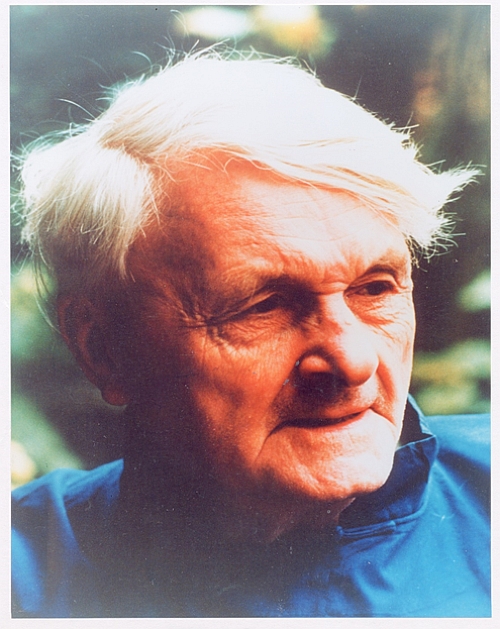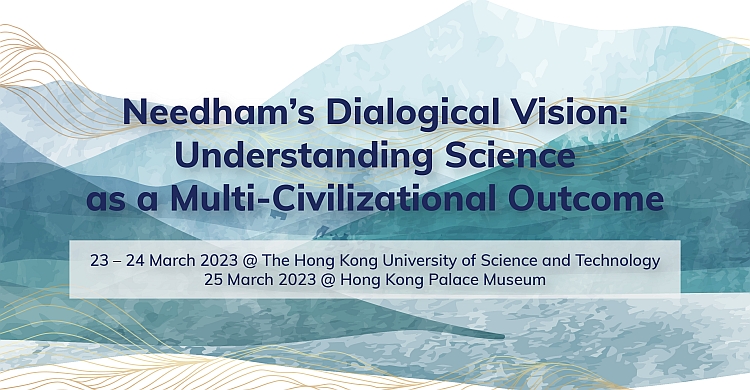
Dr. Joseph Needham
C.H., F.R.S., F.B.A., Sc.D., Hon. Litt.D.
(9 December 1900 – 24 March 1995)
Joseph Needham, F.R.S., F.B.A.
Scientist, Humanist and a Great Intellectual
When Joseph Needham died on 24 March 1995, at the age of 94, the world lost one of its greatest scholars.
Armed with self-taught linguistic skill in classical Chinese, he was the first Western scholar to conduct a comprehensive and comparative study of the history of Chinese science and technology relative to the rise of modern science. By citing many modern scientific and technological advances that originated in ancient China, he authoritatively dispelled a long-held view in the West that China had no science nor made any contribution to modern science.
Joseph Needham, together with his many distinguished collaborators, demonstrated that China and the Near East had made many outstanding contributions in the transformation of ancient to modern science. His monumental work Science and Civilisation in China has been characterized as “perhaps the greatest single act of historical synthesis and inter-cultural communication ever attempted …”.
Joseph Needham was born in London on 9th December 1900, the only son of a highly successful Harley Street medical specialist in anesthesia, and an accomplished musician. He was destined for medicine when he entered Gonville and Caius College of Cambridge University. However, he was soon attracted to the evolving modern science of biochemistry and received a Ph.D. in Chemical Embryology in 1924. His research in the subject was so widely acclaimed that it earned him recognition as the father of chemical embryology. A Foreign Service assignment to China in the early 1940s cemented his fascination with the history of science in China, the field that would dominate his research for the rest of his life.
After the War, he briefly served as the first Director of the Department of Natural Science at the newly formed UNESCO in Paris from 1946 to 1948. Thereafter, he returned to Cambridge, where he was Sir William Dunn Reader in Biochemistry until 1966, and Master of Caius College for 10 years until his retirement in 1976.
He and his wife, Dorothy Moyle, herself an authority in muscle chemistry, were both elected Fellows of the Royal Society in 1941 and 1948, respectively, the first couple ever honored for their scientific contributions by the coveted organization.
Joseph Needham’s association with the study of ancient Chinese science and technology was truly unique. In 1937 he met three young graduate students from China doing doctoral research in Biochemistry at Cambridge. Their arrival at the Laboratory completely changed his life. Of the three, Lu Gwei-Djen had the most profound influence on him. She challenged him to explore the tremendous advances and contributions of ancient Chinese medicine, science and technology to the rise of modern science, and encouraged him to study Chinese, which he followed and subsequently mastered so well that he could easily read classical Chinese texts without assistance. With his scientific knowledge and language ability, he was dispatched to China as the Scientific Counsellor at the British Embassy in Chongqing during the Second World War. In this position he provided scientific advice to the then Kuomintang government, and from this position, he rendered a wide range of assistance to scholars, doctors, and others in war-torn China between 1941 and 1945. In appreciation, many scholars gave him original manuscripts, scrolls, and classical Chinese texts that formed the bulk of his collection and reference materials for his work in the Science and Civilisation in China (SCC) series, and also served as the foundation for the East Asian History of Science Library in Cambridge.
In the meantime, Dr. Lu, after earning her doctorate in nutritional biochemistry at Cambridge, went on to further academic research in the United States during the Second World War and later in the Secretariat of UNESCO in Paris. She was equally influenced by Joseph Needham’s new field of interest and eventually returned to Cambridge in 1957 to become his closest assistant and collaborator in the SCC series, and moreover, married him in 1989 after the death in 1987 of Dorothy Moyle Needham. This happy marriage, unfortunately, did not last long, as Dr. Lu-Needham herself passed away in 1991, leaving Joseph emotionally drained until his own death in March 1995.
Joseph Needham was highly respected by both Beijing and Taipei, and received a host of honorary degrees too many to cite here. He was President of the International Union of the History of Science from 1972 to 1975; the first foreign member and Honorary Professor of the Chinese Academy of Sciences and the Chinese Academy of Social Sciences, respectively. He also received the Order of the Brilliant Star from Taiwan. Apart from being elected an FRS in 1941 he was also elected a Fellow of the British Academy in 1971. In 1992 he was elected a Companion of Honour, and was awarded the UNESCO Einstein Gold Medal in 1988.
A man of remarkable energy with an insatiable drive to learning, he could communicate readily in eight languages. A deeply religious Anglican and lay preacher, he will always be remembered as a bridge-builder between the East and the West.





